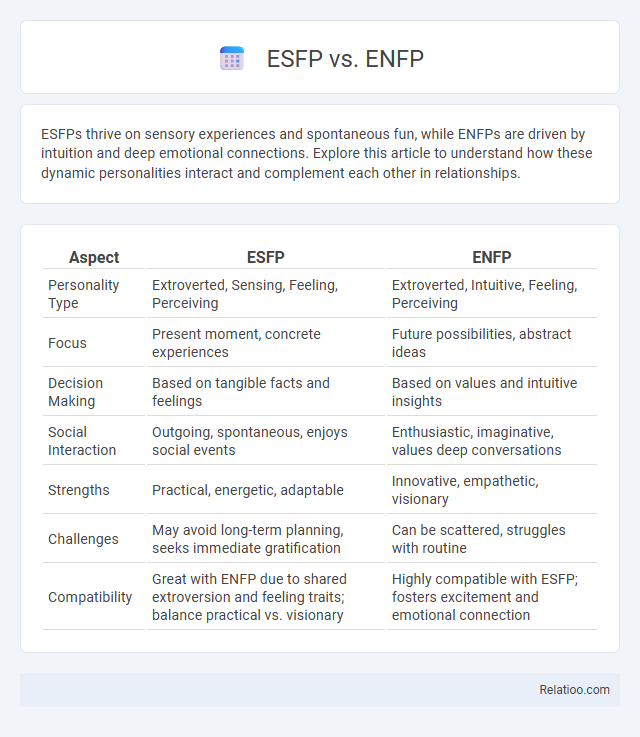ESFPs thrive on sensory experiences and spontaneous fun, while ENFPs are driven by intuition and deep emotional connections. Explore this article to understand how these dynamic personalities interact and complement each other in relationships.
Table of Comparison
| Aspect | ESFP | ENFP |
|---|---|---|
| Personality Type | Extroverted, Sensing, Feeling, Perceiving | Extroverted, Intuitive, Feeling, Perceiving |
| Focus | Present moment, concrete experiences | Future possibilities, abstract ideas |
| Decision Making | Based on tangible facts and feelings | Based on values and intuitive insights |
| Social Interaction | Outgoing, spontaneous, enjoys social events | Enthusiastic, imaginative, values deep conversations |
| Strengths | Practical, energetic, adaptable | Innovative, empathetic, visionary |
| Challenges | May avoid long-term planning, seeks immediate gratification | Can be scattered, struggles with routine |
| Compatibility | Great with ENFP due to shared extroversion and feeling traits; balance practical vs. visionary | Highly compatible with ESFP; fosters excitement and emotional connection |
Understanding ESFP and ENFP Personality Types
ESFP and ENFP personality types both thrive on social interaction and possess strong emotional intelligence, yet ESFPs are more grounded in present sensory experiences while ENFPs emphasize future possibilities and abstract ideas. Your understanding of ESFPs highlights their spontaneous nature and preference for hands-on activities, whereas ENFPs are driven by curiosity and idealism in exploring new concepts. Shared interests include a love for creativity, empathy, and enthusiasm, making both types adaptable and engaging in social environments.
Core Differences Between ESFP and ENFP
ESFPs typically exhibit strong practical awareness and thrive in hands-on experiences, favoring sensory details and immediate environments, while ENFPs prioritize imaginative possibilities and abstract concepts, driven by intuition. ESFPs are more grounded in present realities and tend to seek social excitement, whereas ENFPs focus on future potential and value deep, meaningful connections. Shared interests include a love for social interaction and creativity, but their core difference lies in ESFP's sensory-driven approach versus ENFP's intuitive perspective.
Cognitive Functions: ESFP vs ENFP
ESFPs primarily rely on Extraverted Sensing (Se) to immerse themselves in the present moment and gather concrete sensory information, while ENFPs utilize Extraverted Intuition (Ne) to explore diverse possibilities and future-oriented ideas. Both types share Introverted Feeling (Fi), guiding their decisions through personal values and emotions, fostering authentic connections and shared interests. Understanding these cognitive function differences helps you appreciate how ESFPs focus on tangible experiences and ENFPs on imaginative exploration within their mutual value-driven approach.
Communication Styles Compared
ESFPs communicate through expressive body language and direct, energetic conversations emphasizing present experiences, while ENFPs engage in imaginative, abstract dialogue exploring future possibilities and ideas. Both types share an interest in vibrant, open communication that fosters emotional connection and spontaneity. Your interactions benefit from understanding ESFPs' preference for concrete, sensory engagement and ENFPs' enthusiasm for conceptual, imaginative discussions.
Social Preferences and Interaction
ESFPs thrive on immediate, sensory experiences and engage enthusiastically in social settings, often seeking hands-on activities and lively group interactions. ENFPs are more driven by abstract ideas and future possibilities, enjoying deep conversations and exploring different perspectives with diverse groups. Your shared interest in social connection fuels a strong focus on meaningful engagement, though ESFPs prioritize present-moment energy while ENFPs emphasize imaginative dialogue.
Decision-Making Approaches
ESFPs rely on concrete experiences and immediate sensory information to make quick, practical decisions, often prioritizing harmony and present needs. ENFPs use intuition and future-oriented possibilities to guide their choices, valuing creativity and long-term potential outcomes. Your decision-making approach can be enhanced by recognizing that both types share a preference for exploring options openly but differ in processing concrete versus abstract data during the evaluation.
Career Strengths and Workplace Fit
ESFPs excel in careers requiring hands-on interaction, creativity, and adaptability, thriving in fast-paced environments like event planning, sales, or healthcare. ENFPs bring strong innovation, communication, and vision, fitting well in roles such as marketing, counseling, or entrepreneurship. Both types share strengths in interpersonal skills and enthusiasm, making you effective in collaborative, dynamic workplaces that value flexibility and empathy.
Relationship Dynamics: ESFP vs ENFP
ESFPs thrive on sensory experiences and present-moment engagement, creating energetic and spontaneous relationship dynamics that appeal to your desire for excitement and connection. ENFPs prioritize deep emotional understanding and future possibilities, fostering open communication and imaginative exploration with their partners. Both types share a passion for authenticity and emotional warmth, making their relationships vibrant and mutually supportive despite their different approaches to interaction and planning.
Growth Paths and Potential Challenges
ESFPs excel in hands-on experiences and social interactions, thriving in environments that encourage spontaneity and practical learning, while ENFPs pursue growth through exploring ideas, possibilities, and personal values, seeking deeper meaning in connections and creativity. Both types share a passion for people and new experiences, which fuels your ability to adapt and engage, but ESFPs may struggle with long-term planning and abstract thinking, whereas ENFPs can face challenges with follow-through and emotional overwhelm. Focusing on balancing impulsivity with reflection enables continuous personal development and more sustainable success for individuals identifying with these dynamic personality types.
Tips for Identifying ESFP and ENFP
ESFPs often exhibit a strong preference for sensory experiences, thriving in hands-on, practical activities, while ENFPs are more future-oriented and driven by abstract ideas and possibilities. ESFPs tend to be more spontaneous and action-focused, whereas ENFPs enjoy exploring multiple perspectives and engaging in imaginative discussions. To identify them, observe whether the individual favors concrete, present-moment engagement (ESFP) or intuitive, conceptual exploration (ENFP) alongside their shared enthusiasm for social interaction and emotional expression.

Infographic: ESFP vs ENFP
 relatioo.com
relatioo.com